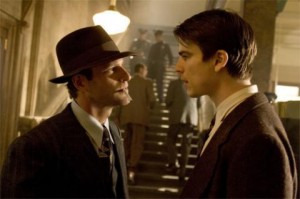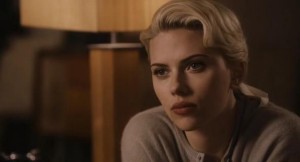|
The Black Dahlia is one of those enigmatic murder cases that continues to fascinate people to this day by virtue of the simple fact that nobody knows who did it, or why. While clearly fictionalized, this film version of the story does bear one very significant thing in common with the real-life case, which is that despite having just watched the film, I still don't know who did it, or why. This important fact, so crucial to the enduring fascination with the actual case, is unlikely, however, to lead to an enduring fascination with the film. 
Based on James Ellroy's breakout novel of the same name, The Black Dahlia received almost universal thumbs-down reviews, which had me puzzled. This wasn't some low-budget, no-name production. This was a film by a respected director with established stars and based upon a popular piece of source material. While such productions can often still be bad, they generally have at least some supporters, and I had to see this for myself to determine just why it was so widely viewed as a train wreck. Now, post-viewing, the picture is a little clearer. That's the picture of the popular opinion; the picture of just what happened in the film is still thick and murky, like that gunky crap that sometimes comes out of your bathtub drain when you pull out a hair clog: it's dark, unpleasant, and you're not quite sure what it is. The film starts well enough. Ignoring the sophmoric "fire and "ice" symbolism, which was admittedly Ellroy's fault, the film looks to have potential. There's a definite noir quality present despite the color stock, and the screenplay seems to make us want to care about these people, specifically new partners Lee Blanchard and Dwight "Bucky" Bleichert, and Lee's girlfriend-but-not-quite-lover Kay Lake, who, as played by Scarlett Johansson, is enough to get asses in seats if you happen to be a man. Unlike many, I also didn't mind that the Dahlia murder takes a good while to come into the picture; the film was a character piece, and I could dig that. However, things start to go awry, and not just with the situations befalling our trio, but with the script itself, as art imitates...uhh, itself, I guess. Blanchard becomes obsessed with the Dahlia case for reasons which are never very clear, and he begins to let other matters slip through the cracks. His girlfriend begins to throw down the "me or your job" ultimatum as girlfriends are so wont to do in films, making me appreciate Will Graham's wife in Manhunter that much more for the sheer fact that she doesn't do this. Meanwhile, Bleichert runs across mysterious femme fatale Madeleine Linscott, a Dahlia wanna-be who, as played by Hilary Swank, looks nothing like the Dahlia as played by Mia Kershner in spite of what everyone in the film claims; one is reminded of the alleged similarity between Kim Basinger and Veronica Lake in LA Confedential. Her family is rich and corrupt, and she herself has a somewhat creepy connection to the murdered girl, the revelation of which provokes a bizarre bit of acting from Josh Hartnett that I can't quite interpret without imagining DePalma offscreen yelling "no, no; you're upset, not amused!" during the take. Things progress in ever-clunkier fashion from there: plot points pop up and then go nowhere, plot points that seemed to not even be plot points so much as offhand comments are suddenly terribly important, and, well, someone or someones kill the Dahlia for reasons that probably came out during the torrent of exposition that accompanies the final act, but be damned if I could keep up with the onslaught of speeches, snippets of old conversations and evil grinning things that constituted the montage of supposed revelation we finally got. Rumor has it that the inital cut of the film ran three hours; I can only assume that somewhere amongst the footage that hit the floor was the part of the plot that actually involved the Black Dahlia murder investigation, which is whittled down to a toothpick herein. 
It's clear that having a mix of good ingredients doesn't guarantee a good end result, in the way that making a cake out of thumbtacks and acid-braised fire ants won't get you...no, wait; let me try that again-like having a country based upon the will of the people, an imbecile for a president and a majority population of nincompoops won't get you...oh, fuck it. This film just doesn't hold together, sadly enough. Perhaps what worked well in the book simply doesn't translate to the medium of film, with its strengths lying in image instead of long soliloqies of information we don't have time to flip back and refresh our memories on as the film is blowing past us relentlessly. It also doesn't help that the two heroes have last names that are entirely too similar, and that Madeleine's painkiller-addict mother is played so far over the top during one crucial scene that you'd think she was high on...oh, fuck it. You can get the picture. That's my picture, and not the picture painted by the film, which is an unfortunate mess. There are dashes of good ideas here and there, but it really could've been so much better, and considering all who were involved, it really should have been, as well. -review by Matt Murray
|
|
||||||||